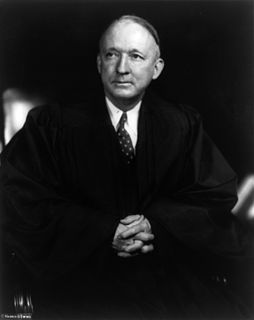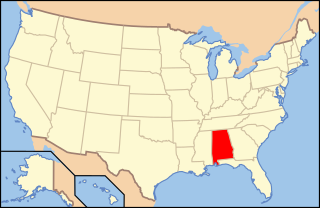Dred Scott v. Sandford, 60 U.S. 393 (1857), often referred to as the Dred Scott decision, was a landmark decision of the US Supreme Court in which the Court held that the US Constitution was not meant to include American citizenship for black people, regardless of whether they were enslaved or free, and so the rights and privileges that the Constitution confers upon American citizens could not apply to them.

Hugo Lafayette Black was an American lawyer, politician, and jurist who served as a U.S. Senator from 1927 to 1937 and as an Associate Justice of the Supreme Court of the United States from 1937 to 1971. A member of the Democratic Party and a devoted New Dealer, Black endorsed Franklin D. Roosevelt in both the 1932 and 1936 presidential elections. Having gained a reputation in the Senate as a reformer, Black was nominated to the Supreme Court by President Roosevelt and confirmed by the Senate by a vote of 63 to 16. He was the first of nine Roosevelt nominees to the Court, and he outlasted all except for William O. Douglas.

An executive order is a means of issuing federal directives in the United States, used by the president of the United States, that manages operations of the federal government. The legal or constitutional basis for executive orders has multiple sources. Article Two of the United States Constitution gives the president broad executive and enforcement authority to use their discretion to determine how to enforce the law or to otherwise manage the resources and staff of the executive branch. The ability to make such orders is also based on expressed or implied Acts of Congress that delegate to the president some degree of discretionary power.

Potter Stewart was an American lawyer and judge who served as an Associate Justice of the United States Supreme Court from 1958 to 1981. During his tenure, he made, among other areas, major contributions to criminal justice reform, civil rights, access to the courts, and Fourth Amendment jurisprudence.

Cumberland School of Law is an ABA accredited law school at Samford University in Birmingham, Alabama, United States. Founded in 1847 at Cumberland University in Lebanon, Tennessee, it is the 11th oldest law school in the United States and has more than 11,000 graduates. Its alumni include two United States Supreme Court Justices; Nobel Peace Prize recipient Cordell Hull, "the father of the United Nations"; over 50 U.S. representatives; and numerous senators, governors, and judges.

Noah Haynes Swayne was an American jurist and politician. He was the first Republican appointed as a justice to the United States Supreme Court.

John Archibald Campbell was an American jurist. He was a successful lawyer in Georgia and Alabama, where he served in the state legislatures. Appointed by Franklin Pierce to the United States Supreme Court in 1853, he served until the outbreak of the American Civil War, when he became an official of the Confederate States of America. After serving six months in a military prison, he resumed a successful law practice in New Orleans, where he opposed Reconstruction.

William Holcombe Pryor Jr. is an American lawyer and jurist who serves as a circuit judge on the U.S. Court of Appeals for the Eleventh Circuit. He is a former Commissioner of the United States Sentencing Commission. Previously, he was the Attorney General of Alabama, from 1997 to 2004.

David Michael Medina is a former Justice of the nine-member Texas Supreme Court. He served in the Place 4 position. He was appointed by Governor Rick Perry in 2004 and subsequently elected to a full-term in 2006. Medina was defeated in the Republican runoff election in 2012 by John P. Devine. His tenure ended on December 31, 2012. All members of the court are Republican.
Joseph Harry Fowler Connick Sr. is an American attorney who served as the district attorney of the Parish of Orleans, which contains the city of New Orleans, from 1973 to 2003. His son, Harry Connick Jr., is a jazz singer, pianist, actor, and humanitarian. Connick Sr. is also a singer, long performing a few nights a week at local clubs as a hobby.

Perry Oliver Hooper Sr. was an American jurist who served as the twenty-seventh Chief Justice of the Alabama Supreme Court from 1995 to 2001. He was the first Republican since Reconstruction to have been elected to his state's highest court.

The 2010 Alabama gubernatorial election took place on November 2, 2010. Incumbent Republican Governor Bob Riley was term limited and unable to seek re-election. The party primaries were held on June 1, 2010, with a Republican runoff on July 13. In the general election, Republican Robert J. Bentley defeated Democrat Ron Sparks.

James Clark McReynolds was an American lawyer and judge from Tennessee who served as United States Attorney General under President Woodrow Wilson and as an Associate Justice of the United States Supreme Court. He served on the Court from October 1914 to his retirement in January 1941. He is best known today for his sustained opposition to the domestic programs of President Franklin D. Roosevelt and his overt anti-semitism.

Lesbian, gay, bisexual, and transgender (LGBT) individuals in Alabama face legal challenges and discrimination not experienced by non-LGBT Alabamians. LGBT rights in Alabama--a Republican Party stronghold located in both the Deep South and greater Bible Belt--are limited in comparison to most other states.
Same-sex marriage has been legally recognized in the U.S. state of Alaska since October 12, 2014, with an interruption from October 15 to 17 while state officials sought without success to delay the implementation of a federal court ruling. A U.S. District Court held on October 12 in the case Hamby v. Parnell that Alaska's statutory and constitutional bans on same-sex marriage violated the Due Process and Equal Protection clauses of the United States Constitution. On October 15, state officials obtained a two-day stay from the Ninth Circuit Court of Appeals, which the United States Supreme Court refused to extend on October 17.

John Dennis Phelan was an American editor, politician and jurist.
In the United States, the legality of incest varies widely between jurisdictions regarding both the definition of the offense and penalties for its commission.
Benjamin F. Saffold (1826–1889) was a Justice of the Supreme Court of Alabama from 1868 to 1874.
Code Of Alabama, By Brittian De Wolf, in 1852 state printer. Alabama State Papers.












